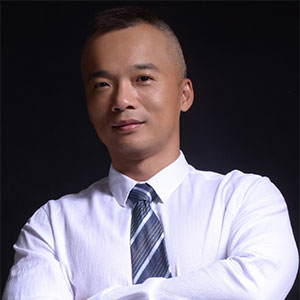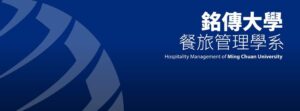Words from the Chair
Dear parents and students
Welcome to the School of Tourism, Department of Hospitality Management’s web pages. As we think that you must very concerned about our teaching ideas and goals in educating the workforce of hospitality industry, herein I share my personal teaching ideas and plans for meeting future challenges with you.

Personal Teaching Ideas/Views
It is very hard to describe the differences in learning conditions between now (how students learn) and then (how I learned). In the past, teachers only used the blackboard to draw a table setting for the course Hospitality Service. Fast food service was the only trend, and practical training did not exist. Therefore, it was almost impossible to apply the course knowledge on the job in the real world. However, hospitality education and practice have become trends due to the advancement of our country.
For the rapid development, the first need is service people for the front line and back of the houses. Hence, well-designed training is very critical to raise the service quality of the front-line staffers. Business knowledge and practical skills of hospitality industry become very important for all. It is my personal belief that teachers should firstly know and understand each student’s character and interests, as well as be involved with students to build excellent teacher-student relationships and to lead the direction of learning. This way, students can have good and right learning motivations.
Beside the teaching role, the teachers should play the role of friend during the after-school time; we should encourage and teach appropriate life philosophy to students. Our university also emphasizes this cultivation of humanity. Teachers pass on knowledge, they interact with students, and direct them to learn how to gain knowledge and develop critical thinking skills.
Our Teaching Style
For my personal teaching philosophy, I pay attention to students’ learning attitude and encourage them to think and to discuss. Generally speaking, students have difficulties to understand what the textbook is about and feelexaminations are only to test our memory. Young students should have positive thinking, so we should ask our students to practice changing all negative words to positive words. For example, I ask students to introduce their strengths and the point of opportunity.
The point of opportunity is an example; students usually run away due to weakness; nevertheless, students can have positive attitudes to face things through a point of opportunity. That is to say, changing the rule can become an opportunity. Once students and teachers have good interactions, learning will easily take place during the classes. It is my view that teachers should not read word by word from the textbook to teach;instead, we should ask questions to inspire the students to think about the concepts in the textbook. Thus students can realize that these are the issues and be stimulated to think. Sometimes, we can ask our students to discuss in groups (not having read the textbook in advance) to find the solutions; then after the discussions, students are allowed to read the book.
Even though students may only have a few answers, those answers are transferring to become their knowledge. This teaching style can cultivate students who have ability for self-directed learning, and not need to memorize the answers from the textbooks anymore. We believe our teaching methods can inspire students’ learning power.
Introduction to the Department of Hospitality
Recently, the hospitality industry is booming in Taiwan. This program of hospitality management plays the role of educating staffers for this professional service industry. Our facilities and equipment match the requirement of the industry, so students can get hands-on experiences and do well on the job. I am certain that it is very important to combine theories and practices because of my personal life experiences as a restaurant manager and doctoral student.
Both “learning by doing” and “doing by learning” are required in the hospitality industry. I personally acknowledge and recognize the School of Tourism of Ming Chuan University. Our program has clear dimensions; including management abilities, practical skills, and applied research. The teaching of undergraduate students focuses on practical skills and basic management abilities so they can apply theories into practices, and practices to professional management knowledge.
Furthermore, the courses of the graduate program can educate students in thoughtful judgement of problems through scientific thinking methods (research methodology and statistics), logical capacity, and the ability to integrate; this training can solve and answer questions. Additionally, the findings of research can be applied to enforce and improve the abilities of practical operation and planning management. Thus, students definitelyshould understand the importance of application of knowledge.
Future Challenges
Due to the fierce competition in the domestic and international hospitality industry, industry knowledge changes rapidly. Theories and knowledge that we learned in the past are likely to fade out in a short period; so the life cycles of products and services of different industries become shorter. Therefore, I personally acknowledge the trend of changes in the rapid development of knowledge. Because of abundant knowledge, it is very important to continue learning and to raise personal professional abilities within limed timeframes. My advice to students is to have positive learning attitudes and goal-oriented thinking.
We can never stop the learning, both ‘learning by doing” and “doing by learning” are critical powers to the growth of knowledge and thoughtful thinking. Hence, students should fully understand the importance of application of knowledge. It is my hope that future students can begin to plan their own learning and career plans in order to raise the standard of the hospitality industry of Taiwan and to promote it globally.
